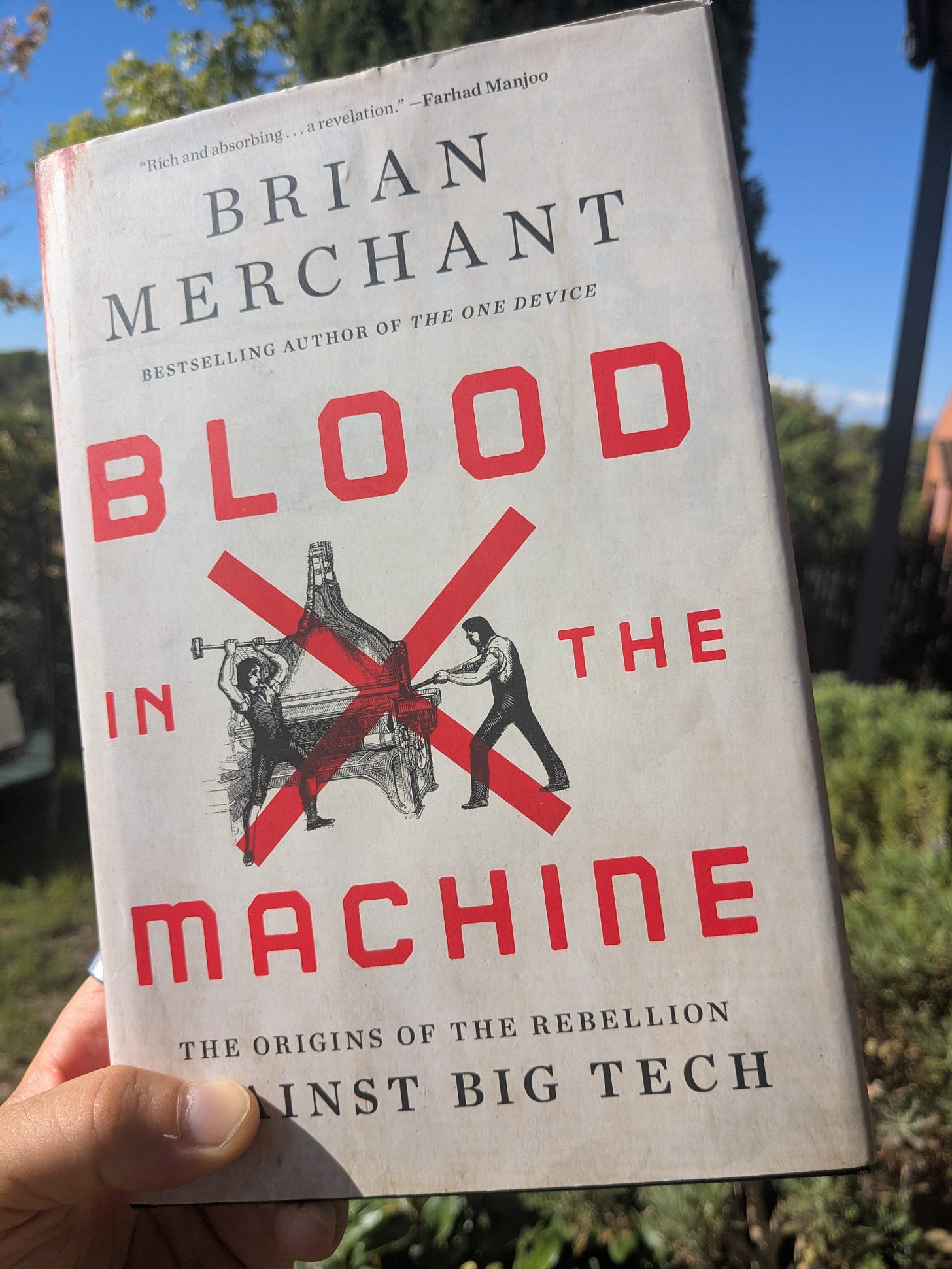📚 Books I read in August 2025
I open this month's segment on summer reads with a great highligh, followed by a couple less demanding reads.
Reading is calisthenics for your brain.
Reading good books is a great way to broaden your knowledge and perspectives.
Reflecting on the books I read every month helps me cement the key learnings from each one of them.
What better than recommending someone else a good book?
Recommending three good books!
Here we are with the August edition of the books I read last month!
I you end up reading one of them, please let me know in the comments section.
💫 Book Highlight: Blood in the Machine by Brian Merchant
Blood in the Machine, by Brian Merchant
416 pages, First Published: May 30th, 2023
I discovered
a few months ago, when I came across one of his articles. I don't remember exactly which one, but it was so good that I immediately upgraded to the paid tier on his Substack and ordered his most recent book, Blood in the Machine. I had been looking forward to reading it, and I wasn't disappointed when I finally got to do it.Blood in the Machine is a highly documented and unapologetically opinionated history of the Luddite movement that arose in the late 18th and early 19th centuries as a form of resistance against the societal consequences of the Industrial Revolution. If you're like me before reading this book, you might believe that the Luddite movement was little more than a bizarre group of people who refused progress and opposed technology. Little more than an Amish group with fewer religious beliefs and hammers in their hands to smash machines.
Reading Blood in the Machine completely changed my understanding and my perspective on the movement, and it did so in many ways.
First of all, the Luddite uprising was more than a marginal and isolated event, as most history books tend to frame it. It has been the first highly documented instance of workers organizing and fighting for their rights to fair working conditions and fair compensation. General Ned Ludd was a mythical figure, one many different groups referred to as their leader, who was elevated as the public face of a movement that involved workers directly or indirectly affected by the extreme push towards automation and labour deskilling. These groups were highly organized, disciplined, and structured, yet very flat in their internal organization. They ran targeted operations in which they only destroyed machines that were being used to degrade working conditions and produced lower quality garments, while preserving all other machinery and tools traditionally used by workmen in the cloth industry.
Most importantly, these groups were not anti-technology. They weren't just aiming for a naive return to the past, trying to obtusely oppose progress. They were opposing a certain use, or shall I say abuse, of technology that led to the concentration of power and capital, and the degradation of working conditions for workers employed in such abusive places called factories.
This passage that recalls a conversation between George Mellow, a leading figure in the Luddite movement, and his cousin Ben, introduces this fundamental nuance at page 46:
George's worry was not that machines might become all-powerful themselves, but that those machine's owners would use them to accumulate power and wealth at his expense. There's a big difference. (Ben shouldn't feel bad for conflating the two; people still do this two hundred years later.) George recognized that those who deploy automation can use it to erode the leverage and earning power of others, to capture for themselves the former earnings of a worker.
Fueled by the laissez-faire approach toward markets promoted by the then-popular economist Adam Smith, the first entrepreneurs got extensive leeway to violate existing rules and laws to push their automation agenda, which was expected to somehow positively contribute to the wealth of the country (UK) while at the same time having a direct negative effect on the living conditions of thousands of workers.
In describing one of the early entrepreneurs, the ruthless Richard Arkwright, Merchant captures the core of the issue in an incisive paragraph:
We can look back at the Industrial Revolution and lament the working conditions, but popular culture still lionizes entrepreneurs cut in the mold of Arkwright, who made a choice to employ thousands of child laborers and to institute a dehumanizing system of factory work to increase revenue and lower costs. We have acclimated to the idea that such exploitation was somehow inevitable, even natural, while casting aspersions on movements like the Luddites as being technophobic for trying to stop it. We forget that working people vehemently opposed such exploitation from the beginning.
So, exploitation, not technology, was the target of the Luddite uprising, yet we tend to associate it with the latter, as it makes it easier to dismiss it and ignore the frequent theme of abuse that is often associated with major technological evolutions, from cloth workers to Uber drivers, from child labour in factories to miserable Amazon warehouse workers.
To further discredit the commonly held belief that Luddites were technophobics, a large portion of them actively worked to influence the legislators, to introduce reforms and proactive approaches to ensure the introduction of machinery would benefit everyone by being introduced gradually, while prohibiting abusive practices in imposing dehumanizing working conditions, child labour, and so on. Their cause even enlisted the support of prominent figures of the period, such as Lord Byron, with no success.
In exploring this aspect of the Luddite movement, Merchant refers to the concept of Machines of Loving Grace1:
Yet then, as now, there was another response to the machinery question: that machines should be embraced, but our politics and societies transformed so that all men and women shared in their benefit. That machines of loving grace will do our work - if the focus is placed on reorienting machine politics, not their pistons.
Reorienting machine politics, not their pistons.
It would be hard to be clearer, yet many still get it wrong.
What makes Blood in the Machine very relevant today is not only its accurate recollection of an important movement that is largely misunderstood two centuries after it happened. It's also the inevitable parallel with the 21st century, dominated by another industrial revolution that is seeing big tech accumulating wealth and power, promising to make everyone's life easier and better, but only seems to deliver on increasing its profits and influence.
What's happening with big AI companies using the work of artists, writers, and other knowledge workers to profit on replacing them with low-quality yet cheap automation is nothing else than the modern iteration of the same dynamics, just a few orders of magnitude bigger due to the insane accumulation of capital and lobbying power. Seeing the US government both successful and failed attempts at pushing big tech agenda to "win the AI race" is a stark reminder of how the UK government sided with the early entrepreneurs and accepted the human cost of reckless automation.
I'm a technologist. I love technology and human ingenuity. But I do also love solidarity, fairness, and treating every human with dignity. I've written before that my way of thinking is becoming increasingly opposed to the way big tech operates. This book helped me realise one thing: one can be both a technologist and a Luddite. The apparent contradiction is a byproduct of repeated - and unfortunately successful - attempts at dismissing the Luddite movement.
One final point, which in the book was presented as a rather marginal aspect, but to me it’s fully central to the discourse. Before the introduction of factories for cloth production, cloth workers would spend seven years mastering the craft, going through the process from journeyman to master. The ethos of craftsmanship was deeply ingrained in that whole industry. Craftsmanship requires passion for the trade, and a healthy dose of ambition: a push to better oneself by increasing one's mastery and dexterity.
That ambition and dedication were a piece of an entire lifestyle. One in which the whole family contributed to the trade, which supported the family in return. One in which the craftsman didn't work the full day, but more like four to six hours, dedicating the rest of their time to family, community, and leisure.
That's the lifestyle that automation keeps promising and failing to deliver. Here we all are, equipped with the most sophisticated set of machinery that ever existed, and working more than craftsmen in the pre-industrial revolution era. I don't know what you think, but to me, this sounds off at a very profound level.
Thanks
for investing what I can only suppose has been an insane amount of time writing this book. I strongly recommend it to anyone who - like me before reading it - has never questioned the definition of the Luddite movement as we've been taught in school or how it's often mentioned in the public discourse.Hopefully, that will push more people to stop using the annoyingly common "I'm not a Luddite, but…" expression, and fully embrace the more virtuous "I'm a Luddite, and…" alternative.
📚 Other Books I Read in August
📘 Un Roman Russe by Emmanuel Carrère
Un Roman Russe, by Emmanuel Carrère
368 pages, First Published: March 1st, 2007
If you've been paying the slightest attention to this recurring monthly segment, you should know that Carrère is an author I particularly like. While we were spending the summer months in France, I loaded up on some of his books I haven't read yet. One of them was Un Roman Russe. Despite the name, this isn't a novel. It's another very Carrèrean (is this a word?) book in which he mixes non-fiction writing with a delightful literary style.
In it, Carrère mixes the origin story of his family (his mother's family was from the white russian faction that fled the country during the October Revolution) with a turbulent relationship with a woman and the chronicles of his experience shooting a documentary in a small russian town named Kotelnitch. Mixing introspection, humour, and historical narration, this is another book I profoundly enjoyed reading. It also gave me a lot more insights around the author himself: the influence his mother has had on his entire life and professional journey, his own relationship with the russian culture and language - a theme that appears often in his books - and his constant fight with depression and neurosis.
I now need to put my hands on a copy of the documentary Back to Kotelnitch2 to complete this exploration. If you know where I can find one, please let me know!
📒 L'Heure des Fous by Nicolas Lebel
L’Heure des Fous, by Nicolas Lebel
331 pages, First Published: January 30, 2013
In one of our many bicycle trips of the summer, we stumbled on a little red van which was effectively a bookshop on wheels. Sitting in front of i,t a couple of authors were signing copies of their books. Unfortunately, I have to admit none of them were familiar to me. Yet, as it often happens with the family, we could not resist the temptation to browse around in the itinerant bookshop, hunting for some new books. On the side, I saw a poster with the list of all the authors who had been signing their books in the previous days, and noticed we had just missed Nicolas Lebel, another author I was still unfamiliar with until that moment. Then I noticed one of his books, a collection of the novels he'd written around the investigations of Merlicht, a character he'd invented and developed for about a decade. What really caught my attention, though, was that the book was prefaced by Olivier Norek, one author I'm very familiar with by now.
That's why I ended up snapping up the massive tome Les Enquetes de Merlicht, despite its almost 2000 pages and having to carry it around in my backpack in the hot summer sunshine.
L'Heure des Fous is the first novel in the series, one I deeply enjoyed reading. It only took me a few pages to realise why Norek praised it.
Merlich is a wonderful literary character, the plot is cleverly constructed, the pace is engaging, and the whole book is full of literary references to great classics, specifically Victor Hugo and his famous book Notre Dame de Paris.
I was so intrigued by the classic references that I ended up buying Hugo's book a few weeks later. I have no problem admitting I've never read it, but it's never too late to fix a cultural gap!
I'm already looking forward to reading all the other books in the collection, so stay tuned for them in the upcoming months.
Engaging with my professional services is a great way to ensure I can continue dedicating many hours each week to producing what I hope to be high-quality content.
Those services revolve around three legs:
Fractional CTO or Advisory roles for startups, scaleups, and established tech companies. Find out more on this page.
Individual Mentoring and Coaching for Engineering Leaders. Find out more on this page.
A paid Community for engineering leaders. Find out more on this page.
If your needs fall into a different category, such as newsletter collaborations or sponsoring, please reply to this email or schedule a free call via this link.
I only knew about the band going by the same name before reading the book and exploring the concept. If you want to engage in a similar exploration, I recommend you start from this Wikipedia page: https://en.wikipedia.org/wiki/Machines_of_Loving_Grace_(disambiguation)
IMDB link, for the curious: https://www.imdb.com/title/tt0348732/





